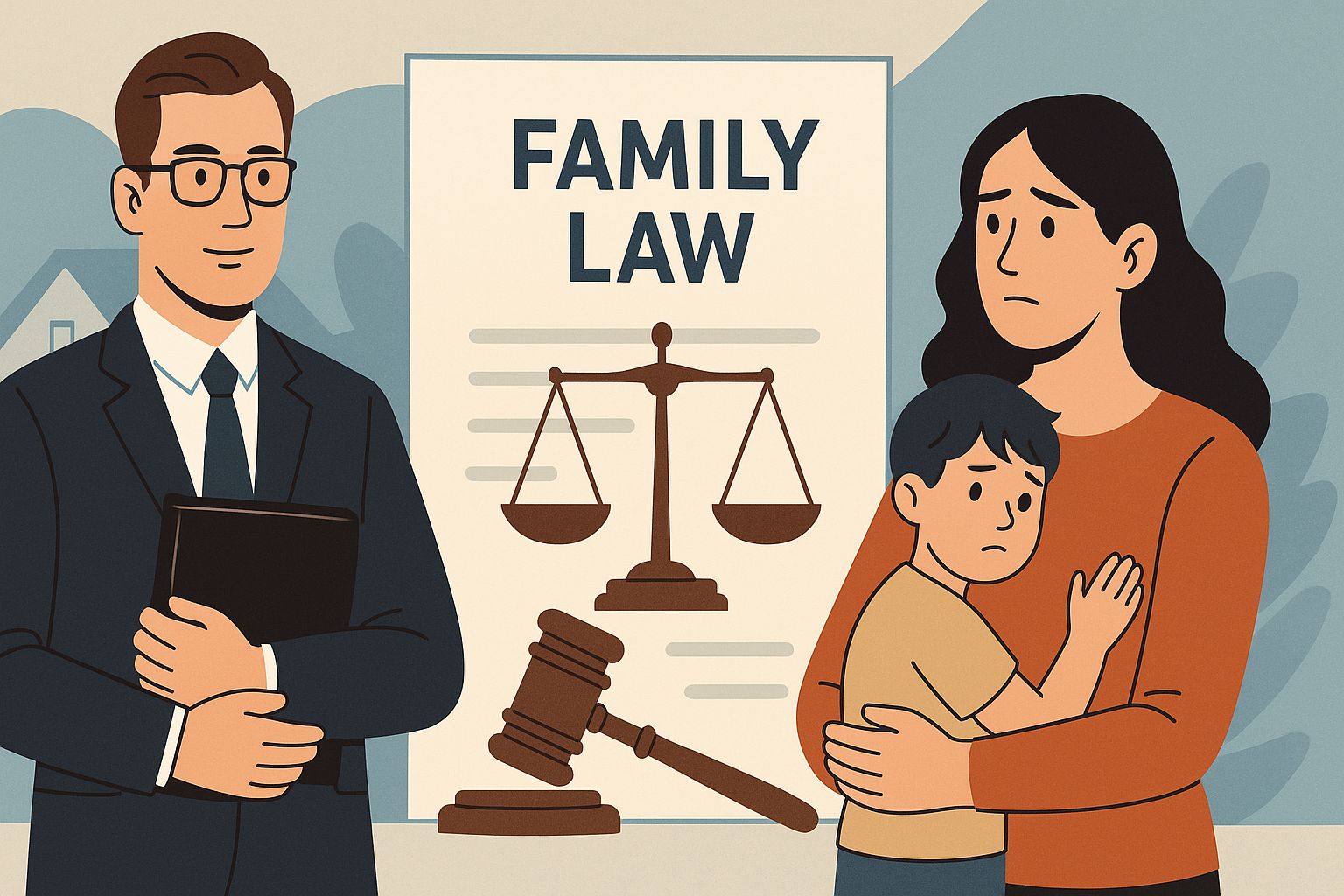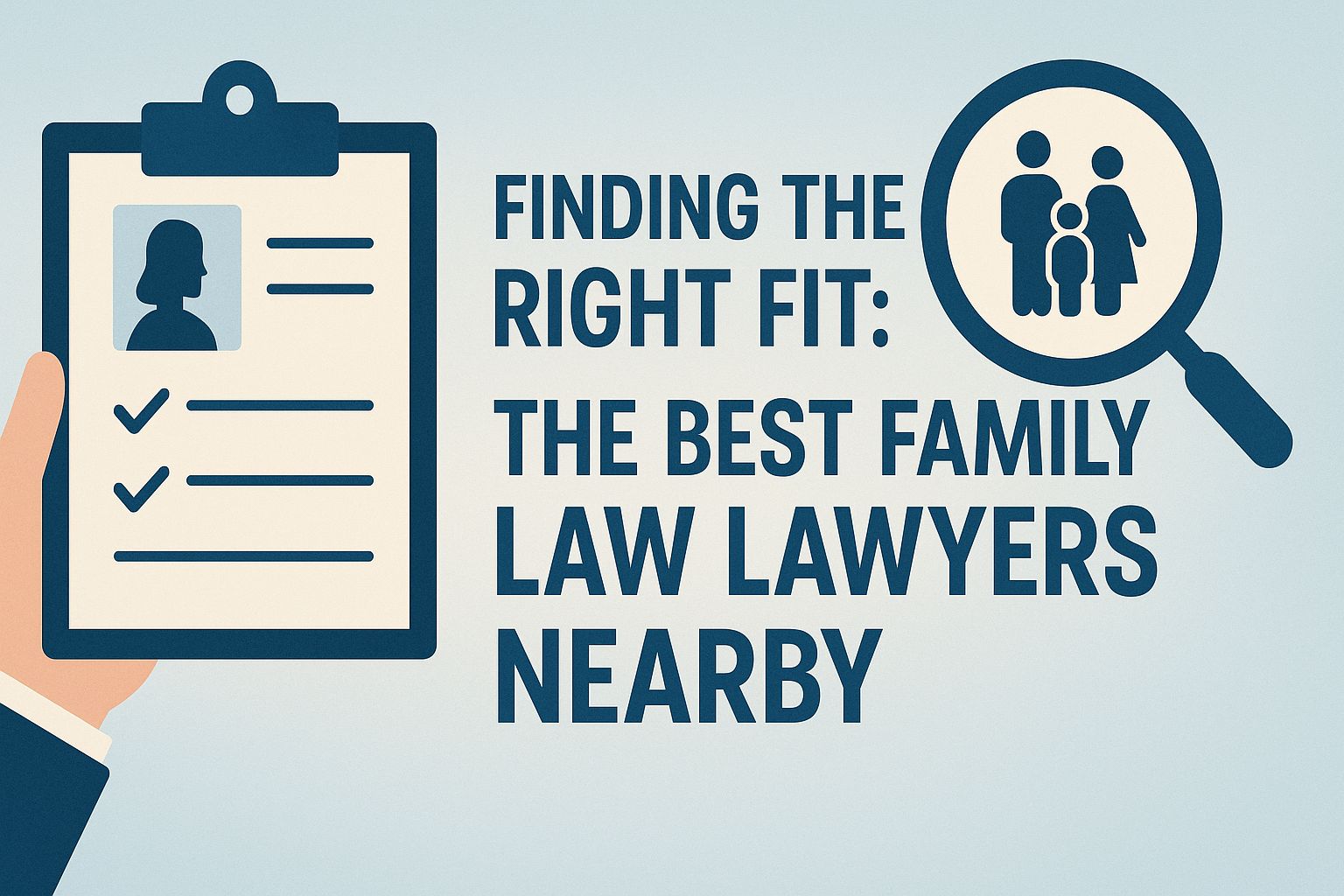Finding the Right Fit: The Best Family Law Lawyers Nearby

Navigating family law issues—whether it's a divorce, child custody dispute, or financial settlement—can be one of life's most challenging experiences. These matters are deeply personal and emotionally charged, requiring not only sharp legal acumen but also a compassionate and understanding approach from your legal representative. This guide is designed to help you understand why a specialist is crucial and how to find the best family law lawyer near you to protect your interests and guide you towards a resolution.
Family law is a specialised field covering a broad spectrum of relationship-based legal issues, including:
Marriage, De facto relationships, and separation
Divorce proceedings
Parenting arrangements (child custody and visitation)
Child support
Property and financial settlements
Spousal maintenance
Binding Financial Agreements (prenuptial and postnuptial)
Domestic and family violence intervention orders
Guardianship and adoption
Given the complexity and sensitivity, choosing the right lawyer is paramount. For more on family law, visit Family Law Section.
1. Why You Need a Specialist Family Lawyer
When facing family law matters, the expertise of a specialist can be invaluable compared to a general legal practitioner. Here's why:
| Feature | Specialist Family Lawyer | General Legal Practitioner |
|---|---|---|
| Knowledge & Experience | Deep, focused expertise in family law legislation, case law, and court procedures. | Broad legal knowledge across various fields; may have limited family law exposure. |
| Strategic Insight | Understands nuances, anticipates challenges, and tailors strategies specific to family law. | May apply general litigation strategies not always suited to family dynamics. |
| Efficiency | Familiar with family court systems, forms, and processes, leading to quicker navigation. | May need more time to research specific family law issues or procedures. |
| Network & Resources | Established network of family law barristers, valuers, counsellors, and mediators. | Network may be more generalised. |
| Accreditation (in Aust.) | May hold specialist accreditation from their state's Law Society (e.g., "Accredited Specialist Family Law"). | Unlikely to have specialist family law accreditation. |
| Up-to-date Knowledge | Continuously updates knowledge on evolving family law legislation and precedents. | Stays updated across multiple fields, making deep specialisation harder. |
A specialist family lawyer brings a depth of understanding that can significantly impact the outcome of your case. They are adept negotiators and skilled litigators, capable of resolving disputes both inside and outside the courtroom while always aiming to protect your interests and, crucially, the best interests of any children involved. Learn more at Law Society of NSW.
2. How to Find the Best Family Law Lawyers Near You: A Step-by-Step Approach
Finding the right family lawyer requires diligence. Here’s a structured approach:
Step 1: Seek Personal Recommendations and Professional Referrals
Start by asking trusted friends, family members, or colleagues if they can recommend a family lawyer they've had positive experiences with. Additionally, professionals like accountants, therapists, or financial advisors who often work with individuals going through separation may have insights into reputable local family lawyers.Step 2: Conduct Targeted Online Research
Use search engines with specific terms like "family law specialist [your suburb/city]," "accredited family lawyer near me," or "child custody lawyer [your area]." Look for:Law Society Directories: Most Australian states and territories have Law Societies (e.g., The Law Society of NSW, Queensland Law Society, Law Institute of Victoria) that list solicitors. Many also have a "Find a Lawyer" service and may identify Accredited Specialists.
Independent Legal Directories: Reputable directories like Doyle's Guide (Australia) rank law firms and lawyers based on peer reviews.
Law Firm Websites: Review lawyers' profiles for their experience, specific areas of family law they handle, and any client testimonials (if ethically presented).
Step 3: Verify Credentials, Specialisation, and Experience
Once you have a shortlist:Accreditation: Check if they are an "Accredited Specialist" in Family Law by their respective state Law Society. This is a significant mark of expertise in Australia.
Years of Practice: Consider how many years they have been practicing specifically in family law.
Case Experience: Enquire if they have experience with cases similar to the complexities of yours.
Step 4: Analyse Client Reviews and Testimonials
Look for client reviews on independent platforms (Google Reviews, legal directories). Seek patterns in feedback regarding communication, professionalism, empathy, and outcomes. While individual reviews can be subjective, consistent themes are insightful.
For additional resources, explore Federal Circuit and Family Court of Australia.
3. Evaluating Potential Family Law Lawyers: Key Factors
After shortlisting, the evaluation stage is crucial.
1. The Initial Consultation: Your Opportunity to Assess
Many family lawyers offer an initial consultation (sometimes free or at a reduced fee). This is your chance to:Checklist for Initial Consultation:
Checklist for Initial Consultation Question/Observation Category What to Ask/Look For Experience & Expertise "How long have you specialised in family law?" "What experience do you have with cases like mine?" Case Strategy & Approach "What would be your initial approach to my situation?" "Do you favour negotiation/mediation or litigation?" Communication How do they explain complex legal terms? How often will I receive updates? Who is my primary contact? Fees & Costs Request a clear breakdown of hourly rates, fixed fees (if any), and potential additional costs (disbursements). Team & Resources Who else will be working on my case? What resources does the firm have? Comfort Level & Rapport Do you feel heard and understood? Do you feel comfortable entrusting them with sensitive information? Discuss the specifics of your case.
Gauge their understanding and preliminary thoughts.
Assess their communication style: Are they clear, empathetic, and patient?
Ask about their proposed strategy and typical approach to similar cases.
Discuss their experience with your specific type of issue.
2. Communication Style and Availability
Effective and regular communication is vital. Choose a lawyer who is responsive, keeps you informed of progress, and explains matters clearly. Understand their preferred communication methods and typical response times.3. Legal Strategy and Approach
Discuss whether they generally aim for negotiated settlements (e.g., through mediation or collaborative law) or if they are more inclined towards litigation. The best approach will depend on your specific circumstances, but their philosophy should align with your preferences where possible.4. Understanding Legal Fees and Costs
Transparency regarding fees is essential. Ask for a written costs agreement detailing their fee structure (hourly rates, fixed fees for certain stages), estimates for different phases of your case, and how disbursements (court fees, barrister fees, valuation fees) are handled.
For guidance on mediation, visit Relationships Australia.
4. What to Look for in Leading Family Law Practices (e.g., in Sydney, Melbourne, Brisbane)
While "best" is subjective, leading family law firms, whether in major cities like Sydney, Melbourne, Brisbane, or regional areas, often share common traits:
Accredited Specialists: A significant number of their lawyers are likely to be Accredited Specialists in Family Law by their state's Law Society.
Strong Team and Depth of Experience: They often have a team with varied experience levels, allowing for appropriate delegation and cost management.
Client-Centric Approach: They prioritise understanding client needs and tailoring strategies accordingly, showing empathy and providing clear communication.
Focus on Resolution: While prepared to litigate robustly, many leading firms prioritise dispute resolution methods like mediation and collaborative practice to achieve timely and cost-effective outcomes.
Reputation and Peer Recognition: They are often well-regarded by peers in the legal community (e.g., listings in Doyle's Guide).
Clear Processes: They have established processes for client onboarding, communication, and case management.
Instead of looking for a generic "Best Family Lawyer Sydney," focus on finding a firm or lawyer in your chosen location that exhibits these qualities and has verifiable credentials. For local legal aid, check Legal Aid Queensland or Legal Aid NSW.
5. Benefits of Working with a Quality Family Lawyer
Expert Legal Guidance: Understanding your rights, obligations, and options.
Strategic Case Management: Navigating complex legal procedures efficiently.
Reduced Emotional Burden: Having a professional manage the legal complexities allows you to focus on personal well-being.
Skilled Negotiation & Advocacy: Protecting your interests in discussions or in court.
Optimised Outcomes: Increasing the likelihood of a fair and favourable resolution.
Focus on Children's Best Interests: Ensuring parenting matters are handled with sensitivity and in accordance with legal principles.
For financial planning during family law matters, see MoneySmart.

6. Frequently Asked Questions (FAQ)
Ask about their specific experience with cases like yours, their proposed strategy, communication frequency, their fee structure, who will be your main point of contact, and what information they need from you. (See the checklist table above for more).
Costs vary significantly based on the lawyer's experience, the firm's location and reputation, and the complexity and duration of your case. Hourly rates can range from a few hundred to over a thousand dollars. Always ask for a costs agreement and an estimate.
This is a lawyer recognised by their state's Law Society as having a high level of expertise and experience in family law. Achieving accreditation involves a rigorous assessment process. Learn more at Queensland Law Society.
Yes, you have the right to change lawyers. You'll need to formally terminate the agreement with your current lawyer and arrange for your file to be transferred. Ensure any outstanding fees are addressed.
Mediation: A neutral third-party (mediator) helps both parties discuss issues and reach a mutual agreement.
Collaborative Practice: Both parties and their collaboratively trained lawyers work together in a series of meetings to find solutions without going to court.
Litigation: Involves taking the case to court for a judge to make a decision. This is usually a last resort.
This varies greatly depending on the complexity of issues, the level of conflict between parties, and court waiting times (if applicable). Simple divorces might take a few months, while complex property or parenting disputes can take 1-2 years or longer if heavily litigated.
7. Conclusion: Making an Informed Choice for Your Future
Finding the best family law lawyer nearby is a critical step in navigating challenging family transitions. By conducting thorough research, asking pertinent questions, and carefully evaluating your options based on expertise, communication, and approach, you can find a legal partner who will effectively advocate for your interests. The right lawyer provides not just legal representation, but also guidance and support, making a significant difference in achieving a fair and sustainable outcome for you and your family.
For additional resources, explore Australian Law Reform Commission, Federation of Community Legal Centres, Services Australia, or Queensland Government Mediation.
AHL Legal: Your Family Law Partner
Need assistance with family law matters? AHL Legal specializes in Australian family law, offering expert guidance on divorce, custody, and financial settlements.
Secure Your Family’s Future with Confidence
Navigating family law issues can be overwhelming, but with the right legal partner, you can achieve a fair resolution.
Whether you’re facing divorce, child custody disputes, or financial settlements, AHL Legal is here to provide expert support.
✅ AHL Legal: Your Trusted Family Law Partner
At AHL Legal, we specialize in family law, offering professional and compassionate assistance for all your legal needs. Our team ensures your interests are protected and your family’s future is secure.
👉 Contact AHL Legal for a confidential consultation or call 1300 91 66 77.
🌐 Visit our website: www.ahllegal.com



 1300 91 66 77
1300 91 66 77







 HOME
HOME


